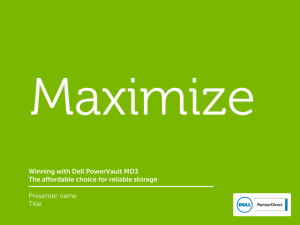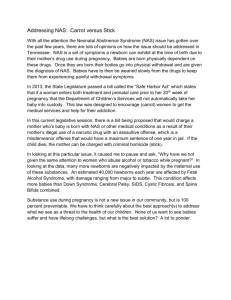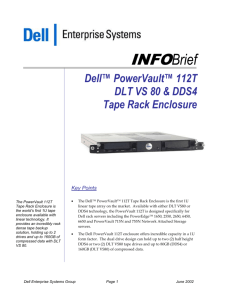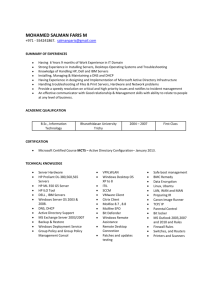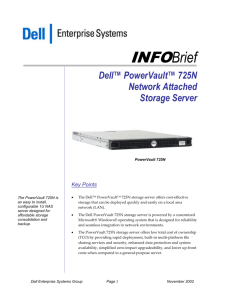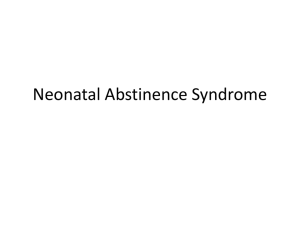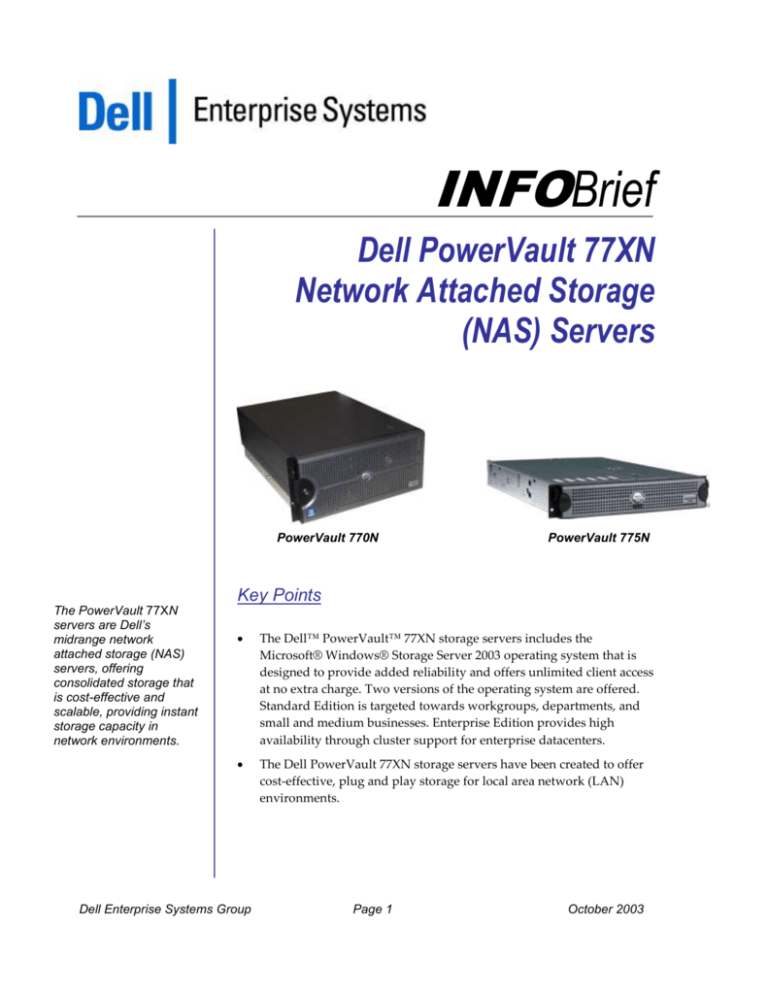
INFOBrief
Dell PowerVault 77XN
Network Attached Storage
(NAS) Servers
PowerVault 770N
PowerVault 775N
Key Points
The PowerVault 77XN
servers are Dell’s
midrange network
attached storage (NAS)
servers, offering
consolidated storage that
is cost-effective and
scalable, providing instant
storage capacity in
network environments.
The Dell™ PowerVault™ 77XN storage servers includes the
Microsoft® Windows® Storage Server 2003 operating system that is
designed to provide added reliability and offers unlimited client access
at no extra charge. Two versions of the operating system are offered.
Standard Edition is targeted towards workgroups, departments, and
small and medium businesses. Enterprise Edition provides high
availability through cluster support for enterprise datacenters.
The Dell PowerVault 77XN storage servers have been created to offer
cost-effective, plug and play storage for local area network (LAN)
environments.
Dell Enterprise Systems Group
Page 1
October 2003
* NOTE: Throughout this
document, both tower and
rack-optimized versions are
collectively referred to as the
PowerVault 77xN.
The PowerVault 77XN storage servers can help lower total cost of
ownership (TCO) by providing rapid deployment, built-in multiplatform file sharing services and security, enhanced data protection
and system availability, simplified zero-impact capacity upgrades, and
lower up-front costs when compared to a general-purpose server.
The PowerVault 77XN NAS servers can connect to Dell™/EMC® fibre
channel storage systems to help increase scalability and performance,
and to help provide extended disaster recovery and business
continuity options as needs and requirements grow. For more
information about PowerVault NAS and Dell/EMC SAN integration,
see the NAS on SAN INFOBrief at
http://www.dell.com/us/en/esg/topics/products_nas_san_pvaul_000_nas_san.htm
The PowerVault 77XN’s intuitive web-based management interface
provides convenient, flexible, centralized administration of the
PowerVault 77XN from remote locations with web access. The PowerVault
77XN also offers enhanced management capabilities that enable easy
management of multiple devices and provide advanced status monitoring.
Snapshots are supported through VSS (Volume Shadow Copy Service),
allowing end users to create and preserve volume images at discrete
points in time. Shadow Copies on the PowerVault 77XN can be created
at any point in time, or scheduled in advance.
The PowerVault 77XN storage server includes data protection software
that allows efficient LAN-free backups of NAS volumes to be
scheduled at any time, to direct-attached Dell PowerVault tape drives,
autoloaders or libraries. Data protection software, from TapeWare or
VERITAS (agent or full version) can be loaded to obtain seamless
integration into existing network backup schemes.
Key Customer Benefits
The key customer benefits of the PowerVault 77XN NAS server are as
follows:
Dell Enterprise Systems Group
Easy to install
The PowerVault 77XN is a rapidly deployable storage solution. In as
little as 15 minutes, the PowerVault 77XN can be set up and made
available for data storage on the network. No additional configuration
is required for other clients or servers on the LAN. Such a rapid
deployment allows customers to “free up” valuable IT resources,
which can help reduce overall costs.
Page 2
October 2003
Intuitive Management from Anywhere
The PowerVault 77XN includes an intuitive, Web-based management
interface allowing administrators to manage one or more mid-range
storage servers from any remote system on the network. As a result, no
mouse, monitor or keyboard is needed to manage the NAS server and
no management software installation is required on any system on the
network.
Advanced Management Capabilities
The PowerVault 77XN offers enhanced management capabilities that
enable easy management of multiple devices and provide advanced
status monitoring.
Extremely Scalable Capacities
Administrators can add storage to existing storage servers without
having to bring the servers down. This allows users the ability to
conveniently access their data while storage is being added. The
PowerVault 775N rack configuration provides 219GB of storage, and
the PowerVault 770N provides 438GB of storage. Both scale to over
16TB with external PowerVault SCSI storage and to over 40TB with
Dell|EMC fibre channel storage.
Highly Reliable Data and System Availability
Powered by Windows Storage Server 2003, the PowerVault 77XN
offers world-class reliability. This includes features such as system file
protection, which helps prevent required system files from being
deleted. Also, VSS provides data protection with the ability to schedule
snapshots to occur regularly, or at a specified period in time.
PowerVault 77XN also includes redundant, hot-swappable power
supplies, cooling units and hard disk drives, providing hardware
reliability and data availability.
Built-in and Configurable Data Protection Options
PowerVault 77XN includes built-in backup and restore software that
helps enable data to be protected from loss, damage, or deletion. By
attaching a qualified Dell tape backup devices directly to the
PowerVault 77XN, backup jobs can be run LAN-free with no impact
on network traffic. Third-party software products including VERITAS
Backup Exec and Tapeware from Yosemite may also be manually
configured to provide integration with existing network backup
schemes.
Dell Enterprise Systems Group
Page 3
October 2003
Low TCO
The simplified architecture of dedicated servers is designed to result in
fewer failures and easier fixes. This can lead to lower costs over the life of
the PowerVault 77XN versus a general-purpose system deployed as a filer.
Since any function not related to file serving has been removed from the
NAS server, initial costs of the PowerVault 77XN are typically lower than a
similar general-purpose server. Another benefit of the PowerVault 77XN is
the ability to have unlimited seat licenses, which can help lower lifetime
costs to the end user.
Background
Unlike server-resident storage that resides internally or attaches externally
to a file server, Network Attached Storage (NAS) is a class of storage
products defined by its direct connectivity to an existing network
infrastructure, such as Ethernet. A NAS server is dedicated as a storage
server, for serving files to users on a network.
Unlike SANs that are optimized for block-level centralized network
applications (such as Exchange, SQL, Oracle or IIS), storage servers are
typically used for storing files associated with client-based applications
(such as Word, Excel, PowerPoint, etc.). Typically NAS servers are used as
a central repository for large, archived files, including graphics, images,
digital photographs, and CAD/CAM. By consolidating files on a dedicated
NAS storage server, management costs can be significantly reduced, and
user accessibility to files is made easier through storage consolidation.
A storage server is dedicated to — and optimized for — serving and
storing data. Dell PowerVault NAS storage servers are designed for the
primary purpose of providing file-serving capabilities within a networked
environment. By implementing this functionality into server architecture,
the following benefits can be obtained:
Rapid deployment of storage anywhere on the network
Simplified manageability from any system through a Web browser
Low TCO, including low acquisition, upgrade and life cycle
management costs
File sharing in mixed computing environments
Print services included with Enterprise Edition or as an optional
upgrade for Standard Edition
Dell Enterprise Systems Group
Page 4
October 2003
NAS and SAN
Users don’t have to choose between a NAS and a SAN solution – with the
PowerVault 77XN, it possible to deploy a storage solution that is
appropriate for an environment today, and can leverage emerging
technologies from Dell in the future. By integrating a PowerVault 77XN
NAS device with a Dell/EMC SAN, it enables users to further expand the
capacity of the NAS device to over 16TB of data using SCSI drives, or up to
40TB with fibre channel drives. Also, the integration of NAS into SAN
enables tape backup of the NAS device over SAN rather than LAN, which
can help improve the performance and reliability of the backups. The
marriage of Dell/EMC fibre channel storage with NAS storage is a logical
next step to help improve NAS capacity, scalability, and high availability.
Product Description
PowerVault 775N 2U Rack Configuration
The PowerVault 775N is a 2U (1U = 1.75-inches) space-optimized midrange network attached storage (NAS) server in a rack form factor. It
delivers up to 438GB of instant storage that can scale up to 16TB with SCSI
arrays or up to 40TB with fibre channel. The PowerVault 775N includes
three PCI-X slots that allow flexibility when choosing network and device
connectivity options required for each specific environment. Remote
management capabilities are provided through an embedded ESM4. The
PowerVault 775N also features dual 10/100/1000 Gigabit Ethernet 1 NICs
and a 533 MHz Front Side Bus (FSB). Choose the PowerVault 775N storage
server to give you instant space saving storage today, while providing
scalability and flexibility for future needs.
PowerVault 770N 5U Rack or Tower Configuration
The PowerVault 770N is a feature-optimized mid-range network attached
storage (NAS) server in a 5U rack or tower form factor server. It delivers
up to 876GB of instant storage that can scale up to 17TB with SCSI arrays
or up to 40TB with fibre channel. The PowerVault 770N has six PCI-X slots
and one PCI slot that can be configured to include network cards, PERC
adapters or fibre channel host bus adapters. The PowerVault 770N also
features a single 10/100/1000 Gigabit Ethernet NIC and a 533 MHz Front
Side Bus (FSB). Choose the PowerVault 770N storage server to give you
expandable storage today, while providing scalability and flexibility for
future needs.
This term indicates compliance with IEEE standard 802.3ab for Gigabit Ethernet, and does
not connote actual operating speed of 1 Gb/sec. For high speed transmission, connection to a
Gigabit Ethernet server and network infrastructure is required.
1
Dell Enterprise Systems Group
Page 5
October 2003
A range of processor and memory options allow the PowerVault 77XN to
meet specific performance requirements.
Processors
Single or dual 2.4GHz or 2.8GHz Intel® Xeon™ processors
Memory
512MB, 1GB, 2GB, 3GB, or 4GB DDR SDRAM with failover DDR memory
support
Set-up
The PowerVault 77XN is designed to enable rapid end user deployment.
Because the PowerVault 77XN is pre-configured to user specifications, the
time and effort to install this storage can be significantly reduced. The
77XN is designed to be “plug and go,” so that the entire set-up process can
take as little as 15 minutes. Windows Storage Server 2003 for NAS
incorporates Plug and Play functionality to automatically detect new
hardware and other hardware changes. Also, adding storage does not
require shutting down any other system on the network, or the network
itself.
RAID Data Performance/Protection
The PowerVault 77XN comes pre-configured from the factory with the
internal drives configured as RAID 5. This can be reconfigured with either
RAID 0 (disk striping), or RAID 1 (disk mirroring). Using external SCSI
arrays (PowerVault 22XS), support is also provided for RAID 1(0) and
RAID 5(0).
Windows Storage Server 2003 OS
The PowerVault 77XN is powered by Microsoft® Windows® 2003
technology, leveraging Microsoft’s extensive engineering expertise. NAS
servers combine characteristics from Windows Server 2003 that offers
reliability, scalability and manageability with an advanced storage feature
set, and an intuitive, browser-based user interface.
The PowerVault 77XN provides support for Windows Server 2003
features, including
Active Directory support allows administrators to efficiently share and
manage information about network resources and users. In addition,
Active Directory acts as the central authority for network security,
allowing the OS to readily verify a user’s identity and control his or
her access to network resources.
Enhanced Distributed File System (DFS) simplifies locating and
managing data on multiple network servers. DFS helps provide high
data availability, name transparency, and flexible volume
administration. With the Windows Server 2003 release, DFS has been
enhanced to allow for multiple DFS root directories on each server.
This means that it is no longer necessary to add an additional server
for each additional DFS root directory.
Dell Enterprise Systems Group
Page 6
October 2003
VSS (Volume Shadow Copy Service) provides the infrastructure for
creating high consistency point-in-time copies of single or multiple
volumes. The service provides effective data protection to both system
administrators and end users.
Using previous snapshots, Shadow Copies for Shared Folders (SCSF)
allows end users to use the “Previous Versions” user interface (UI) to
restore deleted or overwritten files (or whole folders of files) without
the need for system administrator intervention. If a file is mistakenly
deleted or overwritten, the user is empowered to manage their own
files, recovering lost data and fixing mistakes without IT intervention
which can reduce support costs and increase user satisfaction.
Restored files retain the permissions and file preferences associated
with the original files.
Windows Storage Server 2003, Enterprise Edition supports clusters
with up to eight nodes for high availability with Fibre Channel.
Clustering provides high availability for continued uptime in the event
of a system failure. NAS clusters also can improve network
performance by allowing high volume read/write requests to be
balanced among the NAS systems. SCSI clusters support up to 2
nodes.
With the new VDS feature, Widows Storage Server 2003 supports
online volume expansion to take advantage of additional space created
on the storage system by expanding a logical unit.
Encrypting File Systems (EFS) allow administrators to store encrypted
data on NTFS volumes. Data will remain encrypted even if the disk is
moved to another machine.
Change Journal tracks changes made to files and directories on NTFS
volumes. This allows applications like backup tools, indexing tools,
and virus-scanning tools to read all file system changes without rescanning the entire volume.
Disk quotas allow administrators to track or enforce storage limits on a
per-user basis for a specific NTFS volume.
Advanced management capabilities
ADS is a new framework that MS is using to provide multidevice (one-tomany) management for all Windows Server 2003 based operating systems.
Using ADS, scripts can be created to administer large scale deployments of
Windows servers. ADS is an optional add-on for Windows Storage Server
2003, Enterprise Edition available directly from Microsoft.
Dell Enterprise Systems Group
Page 7
October 2003
NAS Status Reporting
The Windows Storage Server 2003 Web user interface (UI) is an HTMLbased application that provides for remote, graphical user interface (GUI)based administration of the storage server. The GUI provides
administrators with a simple means by which to perform the most
common tasks associated with Windows Storage Server 2003
administration. In addition, since Windows Storage Server 2003 is built on
Windows Server 2003, all Windows management functionality is available
on the storage server, including management via Microsoft Management
Console (MMC) and Remote Desktop.
The Windows-powered SAK features system status information – OS
version, memory size, total capacity, and high-level hardware information.
Dell has developed extensions to the UI to simplify access system
information and control NAS functions normally only available through
terminal services or local KVM. For example, using Array Manager,
administers can create and delete volumes, view disk properties, assign
hot spares, and force disks online.
Storage Management Software
Using disks at or near their capacity can put a lot of strain on the system. In
addition, adding more storage takes a great deal of time and money.
Determining which types of files are taking up the most space and
removing them can significantly increase free space on the disk. For
example, if an administrator sees that users are storing unnecessary picture
or music files on the appliance, the administrator can screen these files.
Veritas Storage Manager enables an administrator to put quotas on
directories and shares and generate storage reports. Available as a low-cost
option at the time of purchase, in most installations this application pays
for itself in IT management resources in a very short time.
Comparison to other Dell PowerVault NAS
Solutions
The PowerVault family of NAS products offers easy-to-install and -manage
storage and server consolidation -- see Table 1.
Dell’s mid-range PowerVault 77XN NAS solution leverages all of Dell/
EMC’s SAN-based storage arrays. PowerVault NAS solutions can use both
SCSI and fibre channel back-end storage arrays to store NAS data, which
can help improve the ROI of both NAS and SAN solutions. The
PowerVault 77XN can also perform LAN-less backups or snapshots within
the SAN fabric to Dell’s powerful tape library solutions for fast,
unobtrusive backups that help protect your valuable data with faster
disaster recovery.
Dell Enterprise Systems Group
Page 8
October 2003
Dell’s NAS family includes the following:
PowerVault 725N – Fixed-capacity NAS solution -- pre-configured
storage that’s ready to go.
PowerVault 770N – Ultra 320 SCSI or fibre channel NAS solution
available in a 5U rack or tower form factor for maximum
expandability.
PowerVault 775N- Rack optimized SCSI or fibre channel NAS solution
that features high performance Intel Xeon processors, and advanced
management capabilities.
Table 1
PowerVault NAS Product Comparison
Feature
PowerVault 725N
PowerVault 770N
PowerVault 775N
Max. Storage (per
device)
160, 320, 480GB, or
1TB
876GB (Scalable to
17.2TB with SCSI or
up to 40TB with FC)
438GB (Scalable to
16.6TB with SCSI or
up to 40TB with FC)
RAID
RAID 0, 1, 5
RAID 0, 1, 5, 10, 50
RAID 0, 1, 5, 10, 50
Storage Technology
Ultra ATA/133
(EIDE)
Ultra 320 (U320)
SCSI, fibre channel
Ultra 320 (U320)
SCSI, fibre channel
Storage Expansion
Slots
2
7
3
Internal Disk Speed
7,200 RPM, ATA
10,000 and 15,000
RPM, SCSI
10,000 and 15,000
RPM SCSI
Network
Connectivity
Dual 10/100/1000
Single 10/100/1000
Dual 10/100/1000
Processor
Single 2.0GHz
Celeron®, 2.4GHz
Pentium® 4, or
2.6GHz Pentium 4
Up to two Xeon
processors 2.4GHz or
2.8GHz
Up to two Xeon
processors 2.4GHz or
2.8GHz
Front Side Bus
400MHz
533MHz
533MHz
Memory
384MB, 512MB, 1GB,
1.5GB, 2GB, 3GB
SDRAM
512MB, 1GB, 2GB,
3GB, 4GB DDR
SDRAM
512MB, 1GB, 2GB,
3GB, 4GB DDR
SDRAM
Multiple Server
Management
MDM
ADS (optional)
ADS (optional)
Rack Size
IU
5U rack or Tower
2U
Dell Enterprise Systems Group
Page 9
October 2003
Target Applications
The target applications for the PowerVault 77XN include the following:
Storage Consolidation
The cross-platform file sharing support built into the PowerVault
77XN helps to eliminate the need for organizations to dedicate large
storage resources to any single server. Since the 77XN is not dependent
on any host server, multiple Windows-, UNIX-, Novell-, and Applebased clients can take advantage of a single, centralized storage
repository on the same server.
Server Consolidation
Consolidating multiple Windows NT or Novell® file servers onto a
PowerVault 77XN provides simplified operations with common
processes and standard systems management.
Networked Storage Entry-point
Since the PowerVault 77XN can connect to Dell | EMC storage arrays,
you can start with a NAS solution and then choose to consolidate your
NAS and server storage into a SAN, without the need for special
bridging devices. This helps you leverage your hardware investment
and people resources.
Engineering, CAD
The PowerVault 77XN NAS server provides cross-platform file sharing
support for engineering applications such as CAD and computer
software R&D.
Remote Office Server
For organizations with remote offices that don’t have IT personnel, the
PowerVault 77XN is designed to provide extra storage that can be
installed quickly by non-technical staff. The NAS servers also include
Web-based remote administration with a point-and-click graphical
user interface (GUI), for management from a central location.
Software Distribution
The PowerVault 77XN enables administrators to store software
updates or upgrades on the server, so that individual client users can
perform their own updates or upgrades as needed. This can save
administrators from having to upgrade software on each individual
workstation.
Workgroup File Sharing/Backup
The PowerVault 77XN is an optimal storage device for a workgroup,
as it is designed to reduce network traffic bottlenecks by serving large,
frequently accessed files. This can alleviate file-serving traffic from the
application server(s), which can result in better application
performance over the network.
Dell Enterprise Systems Group
Page 10
October 2003
Imaging and Graphics
Huge graphic files demand maximum performance that can only be
achieved with a server that is optimized for storage services. The 77XN
is an excellent choice for this purpose.
Online Data Warehousing
The avalanche of file servicing loads demanded by data warehouse
applications can easily overwhelm general-purpose servers. The
PowerVault 77XN is designed to handle the volume easily, making it
the right solution for storage of digital music files and other highconsumption files.
Scratch Servers
PowerVault 77XN is the perfect place to store data during a major
server or client upgrade. Simply store user files on a PowerVault
storage server during the transition to keep users productive.
Print Servers
PowerVault 77XN includes Print Services with Windows Storage
Server 2003 Enterprise Edition or as an option with Standard Edition.
Since NAS systems include unlimited CALs (Client Access Licenses),
Windows Storage Server 2003 is an ideal application for the
PowerVault 77XN.
Features and Benefits
The key features, functions, and benefits of the PowerVault 77XN are
shown in Table 2.
Table 2
Key Features, Functions, and Benefits of the PowerVault 77XN
Feature
Function
Benefit
Special-Purpose Server
The PowerVault 77XN is
specialized for file serving
and storage on a LAN,
allowing file-serving
capabilities to be offloaded
from application servers.
By offloading file serving, the
PowerVault 77XN can help
the performance of generalpurpose servers. Also,
because NAS servers are
tuned for this purpose, they
require low administrative
overhead.
1 or 2 Xeon 2.4GHz or
2.8GHz processors
The processor enables the
storage device to become a
server with a dedicated
operating system for
heterogeneous file serving.
The PowerVault 77XN is an
intelligent storage device
that can support clients
using a variety of operating
systems, and can operate on
a variety of networks.
Dell Enterprise Systems Group
Page 11
October 2003
Feature
Function
Benefit
Configuration Flexibility
The PowerVault 77XN is
available with one or two
processors, a variety of
frequencies and a wide
range of memory options.
The configuration flexibility
of the PowerVault 77XN
allows customers to choose
a storage solution for their
unique environments.
Optional PCI-X Slots
The PowerVault 775N
includes three optional PCI –
X slots that can be
populated with additional
PERC cards, LVD/HVD
SCSI cards or Network
Interface Cards.
Adding a PERC card scales
storage capacity.
SCSI or Fibre Channel
Disk Drives
The PowerVault 770N
includes six PCI-X slots and
one PCI slot for maximum
configurability.
The PowerVault 77XN can
be attached to either
external SCSI or fibre
channel drives.
The PowerVault 770N
features Ultra 320 SCSI
drives.
Adding an LVD/HVD SCSI
card allows for the
connection of tape devices
for tape backup.
Adding more NICs improves
the aggregate I/O
performance of the server.
The SCSI drives offer
reliable, cost-effective
storage with data transfer
rates of up to 160MB/sec
(U160) and 320MB/s (U320).
The fibre channel drives
feature high availability and
data transfer rates of up to
200MB/sec.
RAID
The PowerVault 77XN can
be configured with RAID 0,
RAID 1, or RAID 5.
The various levels of RAID
offer performance benefits
(RAID 0), or data protection
(RAID 1, 5).
Scalability
The PowerVault 775N
provides up to 438GB of
internal storage, and the
PowerVault 770N provides
up to 876GB of internal
capacity. Both scale up to
over 16TB with external
SCSI drives and up to 40TB
with fibre channel.
The PowerVault 77XN is
designed to cost-effectively
accommodate massive,
unpredictable demands for
storage without the hassles
of downtime. The direct
connection of up to eight
PowerVault 22XS or Dell
|EMC arrays provides
modular, industry-standard
storage that enables the
customer to grow storage
capacity incrementally.
Dell Enterprise Systems Group
Page 12
October 2003
Feature
Function
Benefit
Windows Storage Server
2003
The PowerVault 77XN is
powered by Microsoft
Windows Storage Server
2003.
The Windows operating
system incorporates the
latest in Windows Server
2003 technology to provide
advanced features combined
with low cost of ownership.
The proven Windows OS
also makes the PowerVault
77XN easy to deploy and
manage with a specially
designed Web user
interface.
Automated Deployment
Services (ADS)
Scheme to administer
multiple NAS servers from a
single location.
Auto-discovery and easy
administration of multiple
NAS devices
Status Reporting
Robust software
administration and
monitoring tool.
Administrators can view realtime performance monitoring
and CPU utilization helping
them to fine tune their NAS
server.
Service and Support
The Dell PowerVault 77XN NAS servers come with the following:
Three-year limited warranty3
Three years of standard next business day parts replacement and one
year of next business day on-site4 labor.
Pre-Failure Alert Program is available for PowerVault systems with
Dell SCSI or fibre channel hard disk drives and DIMM (memory)
monitored by Dell-recognized system management applications.
Telephone technical hardware support 24 hours a day, 7 days a week,
365 days a year
Extensive 24/7 E-Support
The Dell PowerVault 77XN NAS has the following optional services:
Installation Services
Extended Next Business Day Service
Same Day on-site 4-hour Response or Same-Day on-site 2-hour
Response4, which can be supplemented with 6-hour hardware repair
services.
Dell Enterprise Systems Group
Page 13
October 2003
PowerVault Advanced Software and Configuration Support that
provides expert technical phone assistance with the operation and
configuration of Dell PowerVault software and hardware products.
For a complete copy of our Guarantees or Limited Warranties, please write Dell, USA, L.P.,
One Dell Way, Round Rock, TX 78682, attn. Warranties. For more information, visit
http://www.dell.com/us/en/gen/misc/policy_010_policy.htm.
3
Service may be provided by third-party. Technician will be dispatched if necessary
following phone-based troubleshooting. Subject to parts availability, geographical
restrictions and terms of service contract. Service timing dependent upon time of day call
placed to Dell. U.S. only.
4
Dell, PowerEdge and PowerVault are trademarks of Dell Inc. Microsoft and Windows are
registered trademarks of Microsoft Corporation. NetWare is a registered trademark of Novell
Corporation. Macintosh is a registered trademark of Apple Computer Corporation. Linux is a
registered trademark of Linus Torvalds. Other trademarks and trade names may be used in
this document to refer to either the entities claiming the marks and names or their products.
Dell disclaims proprietary interest in the marks and names of others.
Copyright © 2003 Dell Inc. All rights reserved. Reproduction in any manner whatsoever
without the express written permission of Dell is strictly forbidden. For more information
contact Dell.
Dell Enterprise Systems Group
Page 14
October 2003

